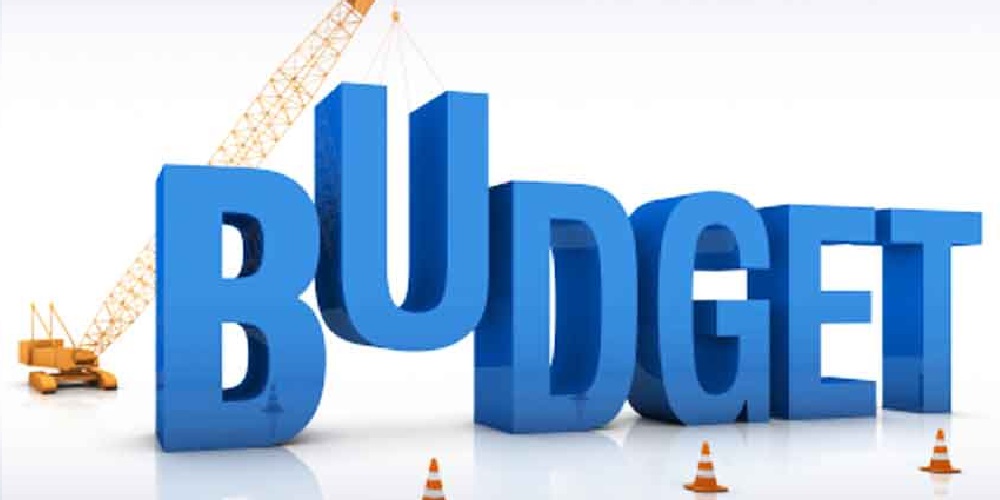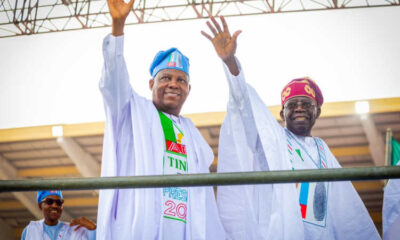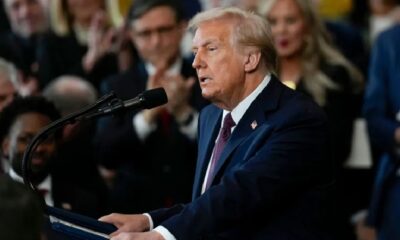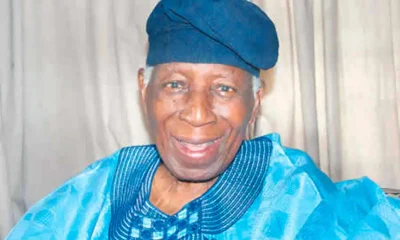Economy
Presidency Clears Air on Alleged Attempt To Run 4 Budgets in 2024 Fiscal Year

The Presidency on Saturday denied claims that it will run four budgets in the 2024 fiscal year.
This came as the President’s Senior Special Assistant on Media and Publicity, Mr. Temitope Ajayi, reacted to a thread of tweets by former Anambra State Governor, Peter Obi, who alleged that the Tinubu-led government was running four budgets concurrently.
Ajayi wrote “Yesterday, @BudgITng raised a false alarm on the basis of rumours that FG is planning a 2024 supplementary budget.
“It is important to state that the FG is not planning to run 4 budgets within a fiscal year as being alleged.
“The National Assembly only approved that implementation of the capital components of 2023 budget and 2023 supplementary should be extended to December 2024 to achieve its objectives.”
Ajayi said Nigeria cannot achieve sustainable development when Federal, States and Local governments focus on only consumptive expenditures which is essentially what recurrent expenditures represent.
“It is the capital expenditures that drive economic growth, strengthen private sector output and create employment opportunities for citizens,” he added.
He cautioned the civic organisation, Budgit, to be wary of flippancy and the propensity to be unduly sensational.
“Expectedly, @PeterObi has jumped on the false claims to push his new round of misinformation,” he said.
In an earlier interview with our correspondent, the Special Adviser to the President on Information and Strategy, Mr. Bayo Onanuga, said the 2023 and 2024 budgets would run simultaneously.
His comments follow a decision by the National Assembly to extend the responsive period of the 2023 budget from June 2024 to December 2024.
It had been moved from December 2023 to March 2024 earlier.
“They are some elements of that (2023) budget that were not implemented. That is why they are moving it forward to be implemented,” explained Onanuga.
He added, “They have already gotten the provisions meant for them. So they are trying to make sure they implement them based on the provision of that budget.
“It means the 2023 and 2024 budget will run concurrently.”
PUNCH Online earlier reported that a non-profit organisation, BudgiT, condemned the proposed elongation of the implementation period of both the 2023 annual and supplementary budget by the Federal Government, describing it as an anomaly.
In a Friday statement by its communications officer, Nancy Odimegwu, BudgiT said it was worrisome that the Federal Government could be drafting a 2024 supplementary budget to be implemented alongside the 2023 yearly budget, 2023 supplementary budget, and 2024 annual budget.
Economy
Crude prices slump to $65 first time since 2021

Oil prices plunged this week to $65 per barrel as the United States import tariffs and an unexpected OPEC+ supply hike erased $10 per barrel from global benchmarks.
The price appreciated last week when US President Donald Trump imposed tariffs on any country that buys crude from Venezuela.
However, oil prices turned around the corner as of Friday, with Brent falling to $65, the first time since 2021.
According to oilprice.com, the combined effect of Trump’s import tariffs, OPEC+’s inopportune decision to speed up the unwinding of production cuts, and China’s retaliatory actions wiped off $10 per barrel from global oil prices, “with ICE Brent falling below $65 per barrel for the first time since August 2021.”
The US West Texas Intermediate crude futures lost $4.96, or 7.4 per cent to end at $61.99.
“Seeing backwardation barely change compared to the beginning of the week, one could assume that US tariffs are the defining factor for the price change. Nevertheless, this week will not go down well in the history of oil markets,” oilprice.com reports.
China’s retaliatory tariffs on US goods have escalated a trade war that has led investors to price in a higher probability of recession.
China, the world’s top oil importer, announced it will impose additional tariffs of 34 per cent on all US goods from April 10.
According to Reuters, nations around the world have readied retaliation after Trump raised tariffs to their highest in more than a century.
Aside from the tariffs, another factor that further pressured oil prices was the Organisation of the Petroleum Exporting Countries and Allies’ decision to advance plans for output increases.
The group now aims to return 411,000 barrels per day to the market in May, up from the previously planned 135,000 bpd.
Economy
CBN allocates $197.71m into FX market to support naira

The Central Bank of Nigeria has injected $197.71m into the foreign exchange market on Friday, April 4, 2025, as part of its commitment to ensuring adequate liquidity and maintaining orderly market functioning.
This was disclosed in a statement on Saturday by the Director of the Financial Markets Department, Dr Omolara Omotunde-Duke, reiterating the bank’s stance on maintaining market integrity and operational transparency.
The statement read, “In line with its commitment to ensuring adequate liquidity and supporting orderly market functioning, the CBN facilitated market activity on Friday, April 4, 2025, with the provision of $197.71m through sales to authorised dealers. This measured step aligns with the bank’s broader objective of fostering a stable, transparent, and efficient foreign exchange market.”
The CBN said the intervention was in line with its broader objective of fostering a stable, transparent, and efficient foreign exchange market.
It added that it remained focused on sustaining liquidity levels to support smooth market operations amid ongoing global economic adjustments.
The apex bank said the decision to boost liquidity in the FX market came against the backdrop of significant shifts in the global macroeconomic landscape, which had affected many emerging markets and developing economies, including Nigeria.
It noted that the recent introduction of new import tariffs by the United States on goods from several economies had triggered adjustments across global markets.
It added that crude oil prices—a major revenue source for Nigeria—had dropped by over 12 per cent, settling at approximately $65.50 per barrel.
The CBN said the downturn posed challenges for oil-exporting countries, influencing exchange rate dynamics and market sentiment.
The CBN stressed that it would continue to monitor both global and domestic market conditions. It expressed confidence in the resilience of Nigeria’s foreign exchange framework, which it said was designed to adjust appropriately to changing economic fundamentals.
The bank also urged all authorised dealers to strictly adhere to the principles outlined in the Nigerian FX Market Code, promoting transparency and upholding the highest standards in their transactions with clients and market counterparties.
Meanwhile, Nigeria’s official exchange rate fell to N1,600/$1 at the end of trading on April 4, 2025, as the tariffs imposed during the Trump era continued to impact global markets.
Data from the CBN showed that the naira closed at N1,600/$1, marking a 1.9 per cent depreciation compared to the N1,569/$1 recorded the previous day.
The figure also marked the weakest level the naira had reached since December 4, 2024, when it closed at N1,608/$1. The exchange rate has now weakened by 3.9 per cent in the first four days of April, after closing March at N1,537/$1.
According to the CBN, the exchange rate closed at N1,600/$1 on Friday, marking a 1.9 per cent drop from the previous day.
The intra-day highs and lows were reported as N1,625 and N1,519 to the dollar, respectively. The intra-day high of N1,625 is also one of the highest levels recorded this year, indicating that traders priced the naira at significantly weaker levels.
Conversely, the intra-day low of N1,519/$1 suggests that some traders still priced the naira stronger, possibly betting on short-term interventions.
The NFEM rate, which represents the average exchange rate, closed at N1,567, the weakest the naira has traded this year and since December 4, 2024.
Economy
Trump gives TikTok extra 75 days to find US buyer

President Donald Trump has given TikTok a 75-day extension, staving off a ban on the Chinese-owned app just as its April 5 deadline loomed.
In a Friday post on Truth Social—his social media platform- the US President trumpeted an executive order to extend negotiations, a move he cast as a lifeline for a deal he’s keen to seal.
“My Administration has been working very hard on a Deal to SAVE TIKTOK, and we have made tremendous progress,” Trump wrote.
“The deal requires more work to ensure all necessary approvals are signed, which is why I am signing an Executive Order to keep TikTok up and running for
an additional 75 days.”
The ban, initially deferred on his first day back in office in January, had been barrelling toward an April 5 cutoff—now pushed out once more.
TikTok’s parent company, ByteDance, has been under pressure to divest its US business following bipartisan legislation passed in 2024 that mandates the app’s separation from Chinese ownership.
Trump laced his announcement with a jab at China, irked, he said, by his reciprocal tariffs. “We hope to continue working in good faith with China,” he added, calling tariffs “the most powerful economic tool” and vital for national security.
“We do not want TikTok to ‘go dark,’” he insisted, eyeing a resolution that keeps the app alive.
We look forward to working with TikTok and China to close the deal. Thank you for your attention to this matter!”
-

 Politics9 hours ago
Politics9 hours agoTinubu Gives Fani Kayode, Others New Appointments (See Full List)
-

 News9 hours ago
News9 hours agoDANGER! Ex-Soldier Abubakar Affan Vows to Kill VeryDarkMan ‘Like Deborah Samuel’
-

 News13 hours ago
News13 hours agoWhy NYSC maybe extended by FG- Minister
-

 News23 hours ago
News23 hours agoVOA Halts Operations In Nigeria, Others Over President Trump
-

 News12 hours ago
News12 hours agoIbas moves to rehabilitate damaged Rivers LG secretariats
-

 News9 hours ago
News9 hours agoJust in: Ex-Oyo governor, Olunloyo is dead
-

 Economy12 hours ago
Economy12 hours agoCBN allocates $197.71m into FX market to support naira
-

 News12 hours ago
News12 hours agoWike commissions another solar-powered market in Abuja






